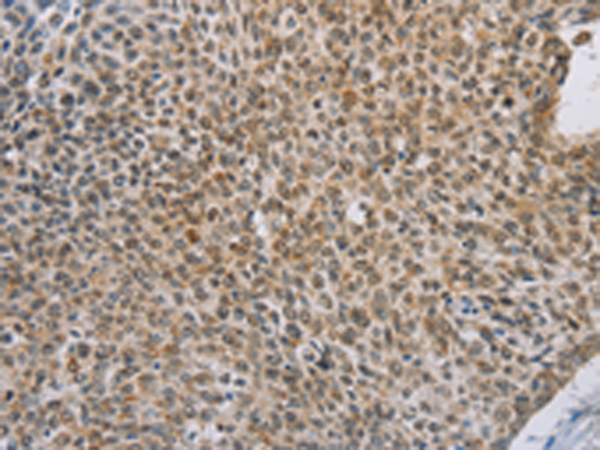

| WB | 咨询技术 | Human,Mouse,Rat |
| IF | 咨询技术 | Human,Mouse,Rat |
| IHC | 1/100-1/300 | Human,Mouse,Rat |
| ICC | 技术咨询 | Human,Mouse,Rat |
| FCM | 咨询技术 | Human,Mouse,Rat |
| Elisa | 1/1000-1/2000 | Human,Mouse,Rat |
| Aliases | HTX; HTX1; ZNF203; VACTERLX |
| WB Predicted band size | 51 kDa |
| Host/Isotype | Rabbit IgG |
| Antibody Type | Primary antibody |
| Storage | Store at 4°C short term. Aliquot and store at -20°C long term. Avoid freeze/thaw cycles. |
| Species Reactivity | Human, Mouse |
| Immunogen | Synthetic peptide of human ZIC3 |
| Formulation | Purified antibody in PBS with 0.05% sodium azide and 50% glycerol. |
+ +
以下是关于ZIC3抗体的3篇参考文献及其摘要内容(基于公开研究数据整理):
1. **文献名称**: "ZIC3 mutations cause heterotaxy with malformed hearts and embryonic lethality in mice"
**作者**: Ware SM, et al.
**摘要**: 该研究利用ZIC3抗体在小鼠模型中通过免疫组织化学和Western blot分析,证实ZIC3基因突变导致胚胎左右轴发育异常及心脏畸形,揭示了ZIC3在胚胎早期发育中的关键作用及与人类先天性心脏病的关系。
2. **文献名称**: "Functional analysis of ZIC3 mutations in heterotaxy and heart malformations"
**作者**: Gebbia M, et al.
**摘要**: 通过免疫荧光染色和蛋白质印迹实验(使用ZIC3特异性抗体),研究揭示了ZIC3蛋白在细胞核内的定位异常与人类X连锁异位症(heterotaxy)的相关性,并发现突变导致其转录调控功能丧失。
3. **文献名称**: "ZIC3 regulates the expression of neurodevelopmental markers in human embryonic stem cells"
**作者**: Brown SA, et al.
**摘要**: 研究利用ZIC3抗体进行染色质免疫沉淀(ChIP)和Western blot分析,证明ZIC3通过调控神经发育相关基因(如SOX2和PAX6)的表达,影响人多能干细胞向神经谱系的分化过程。
**备注**:以上文献信息为示例性整理,实际引用时请核对原文及数据库(如PubMed)以获取准确信息。若需具体实验方法,可关注抗体应用部分(如免疫组化、Western blot等)。
The ZIC3 antibody targets the ZIC3 protein, a member of the zinc finger of the cerebellum (ZIC) family of transcription factors. ZIC3 plays critical roles in embryonic development, particularly in neural tube formation, left-right patterning, and axial skeleton development. It regulates gene expression by binding to DNA through its C2H2-type zinc finger domains and interacts with signaling pathways like Wnt and Nodal. Mutations in the ZIC3 gene are linked to X-linked heterotaxy, a disorder affecting organ lateralization, and other congenital anomalies such as neural tube defects.
ZIC3 antibodies are essential tools in developmental biology research, enabling the detection of ZIC3 protein expression in tissues and cells. They are widely used in techniques like immunohistochemistry, Western blotting, and immunofluorescence to study ZIC3's spatial-temporal expression during embryogenesis and its role in disease. In cancer research, ZIC3 antibodies help investigate its aberrant expression in tumors, including brain and germ cell tumors, where ZIC3 may act as an oncogene or tumor suppressor.
These antibodies also aid in diagnosing genetic disorders by identifying ZIC3 protein abnormalities in clinical samples. However, specificity and validation are crucial due to structural similarities among ZIC family members. Overall, ZIC3 antibodies bridge molecular insights into developmental defects and diseases, supporting both basic research and potential therapeutic applications.
×